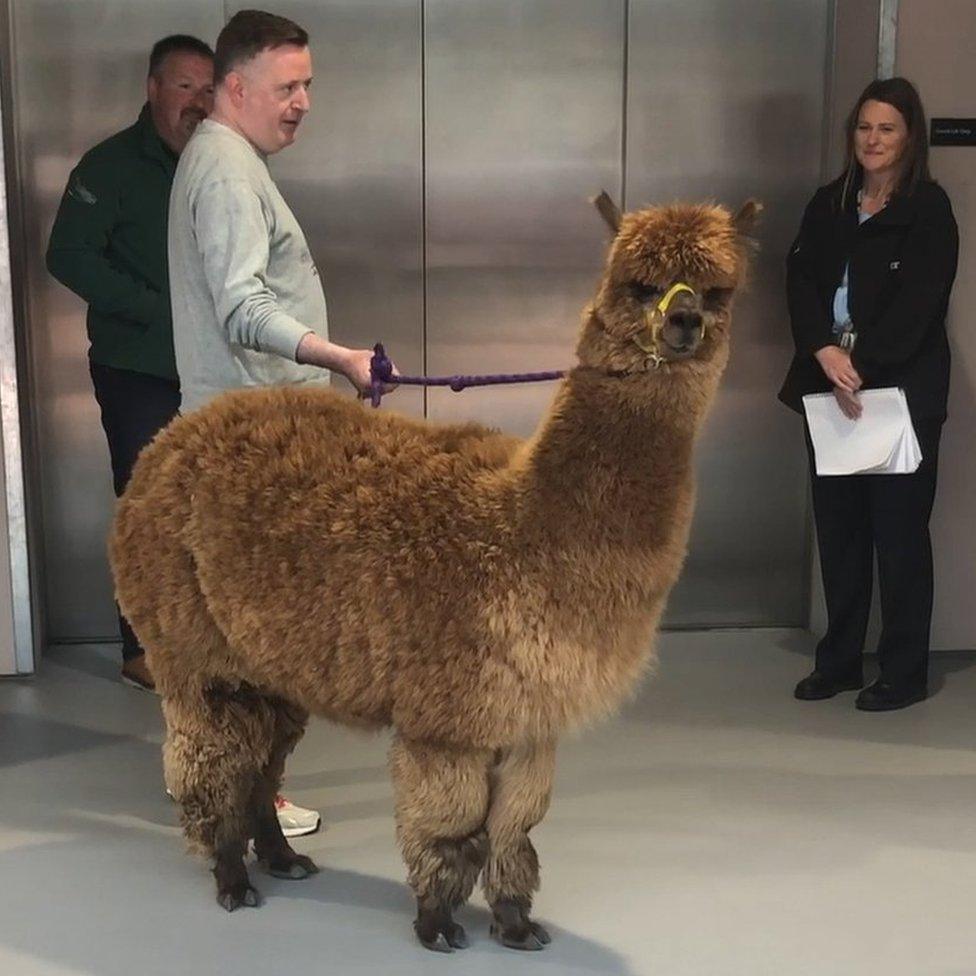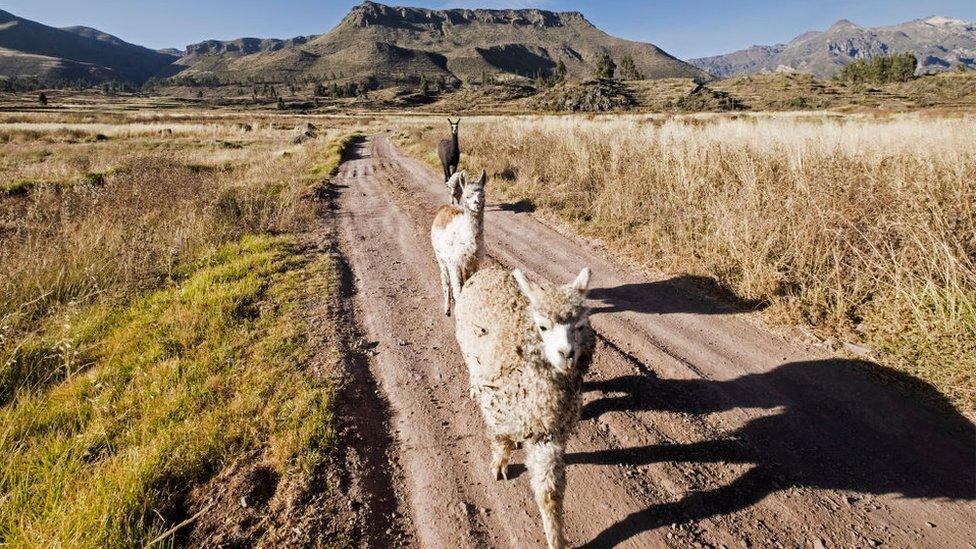I brought an alpaca up like a baby - now she thinks I'm her mum
- Published
Annie the alpaca was a guest on a BBC radio programme
When Dannie Burns quit his job with a double-glazing company 10 years ago, his first thought was to buy a sports car and travel around Europe.
But after a spot of online trawling through alternative career paths, he opted to buy two alpacas instead.
Dannie now owns 75 of the South American animals on his trekking farm in Thornhill, near Stirling.
But one in particular, Annie, has become more of a pet who "thinks she's a dog" and rides in his car.
Annie has turned more than a few heads among startled onlookers, external on her various trips into town.
"She goes everywhere with me - we go to schools, colleges, old folks' homes," Dannie told BBC Scotland's Mornings with Kaye Adams programme.
"We drive around with her head out the window of the back of the car. I actually got stopped by the police this morning.
"They pulled us over for a road safety check and they couldn't believe it. They took pictures of her.
"We put the back seats down and as soon as we start moving, she lies down until we stop at a traffic light or something. Then she'll stand up and stick her head out the window, and sit down once you start moving again."

Annie is now pregnant after "jumping in the field with the boys"
Annie, who is about 4ft tall, was born two years ago, but her mother rejected her.
Another alpaca born at Dannie's farm a year earlier did not survive rejection.
"We thought 'if it happens again, this time we'll take her away'," he said. "There was no point making her life worse."
Annie proceeded to live in the family house for six months like a baby.
"This time I learned fast what to do," Dannie explained. "I had to get goat's milk, milk replacer, colostrum, all sorts of stuff to keep her alive. Now she thinks I'm her mum.
"As with any newborn, she was fed every two hours right around the clock. We just looked after her and brought her up ourselves."
'No boundaries'
Nowadays, Annie sleeps in the porch of the family home.
"Basically she just wants to be next to where I am," Dannie said. "You smile every time you wake up in the morning and see this wee face looking out the window.
"We put her out in the field with the other alpacas and she has nothing to do with them. She really doesn't think she's one of them. So she just hangs about by the gate."
Dannie says Annie is "definitely house-trained" and "thinks she's a dog" after following the example of the family's other pets in her early months.

Alpacas are usually found on high-altitude plains in countries such as Peru, Bolivia, Ecuador and Chile
"Every time we fed her, we put her out with the dogs and then she just copied them," he said.
"She wanders anywhere she wants on the farm, she has the freedom to roam where she likes.
"We just have to watch what she eats because she'll eat everything - polythene bags, sweets, toys, crisps, sandwiches.
"She tries to steal stuff out of customers' cars when they come to the farm. She's terrible, she really is. She has no boundaries."
'The family think I'm mad'
Annie is one of an estimated 6,000 alpacas in Scotland, Dannie says, and part of a UK-wide total of about 75,000 to 80,000.
More often to be found in high-altitude areas in the Andes, the camelids were first brought to the UK about 25 years ago - "purely for people to exhibit them and show off their fleeces", Dannie told Radio Scotland.
In countries such as Peru they are killed for their meat and wool, but alpacas are used in the UK for activities such as trekking, increasingly helping some people relieve stress and anxiety.
"We do trekking, events, weddings, galas, sports days, you name it," Dannie said. "Annie goes anywhere and everywhere.
"Alpacas are nice and easy to get on with, pretty placid. They are inquisitive and nosey. If you go into a field, they will come and say hello.
"I've trained Annie to jump in the back of car, and stand up on her hind legs for carrots.
"The rest of the family think I'm mad. They think she's mad as well. She's really a pet now."
Baby due
Dannie has three older daughters and his four grandchildren "love Annie to bits".
But visitors to the farm may soon have a rival for their affections.
"She decided she wasn't happy just hanging about with me, so she jumped in the field with the boys", Dannie reported.
Annie is now pregnant, with the baby due in August or September.
"We don't know if she will accept the baby, or whether she will be a great mum or not," Dannie said. "We'll see. I may have to raise that one too."